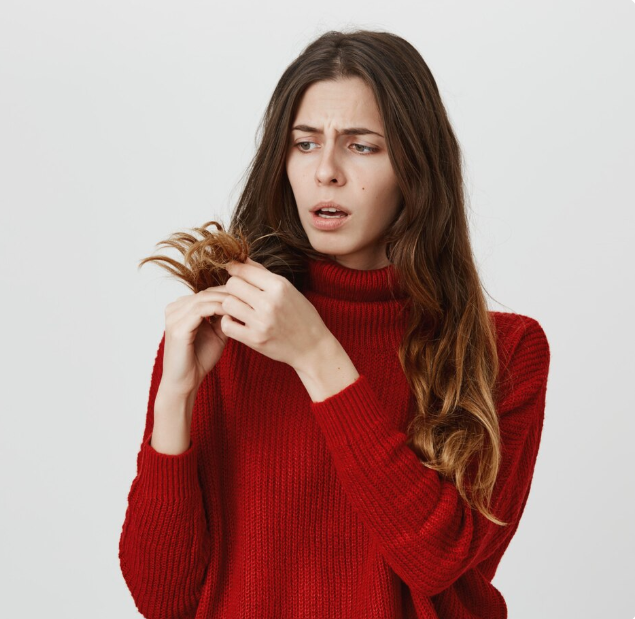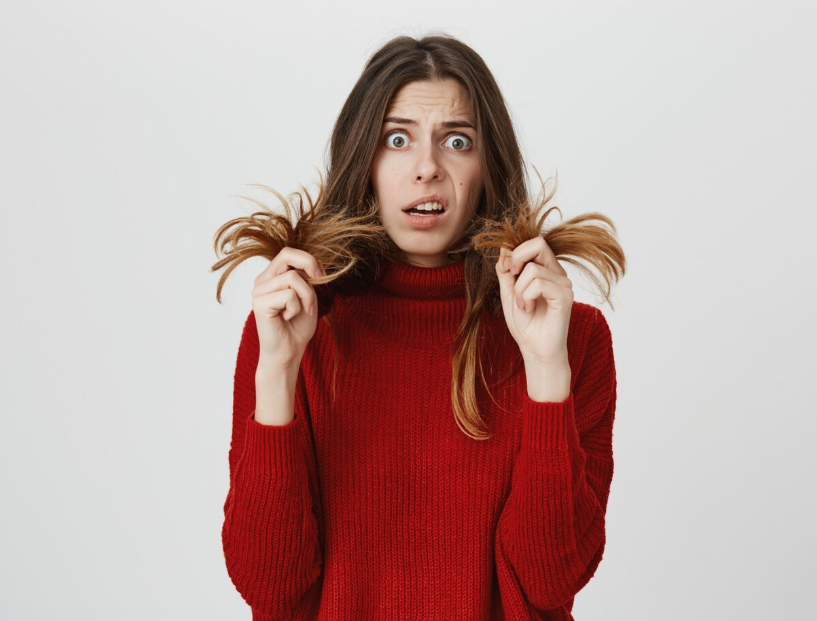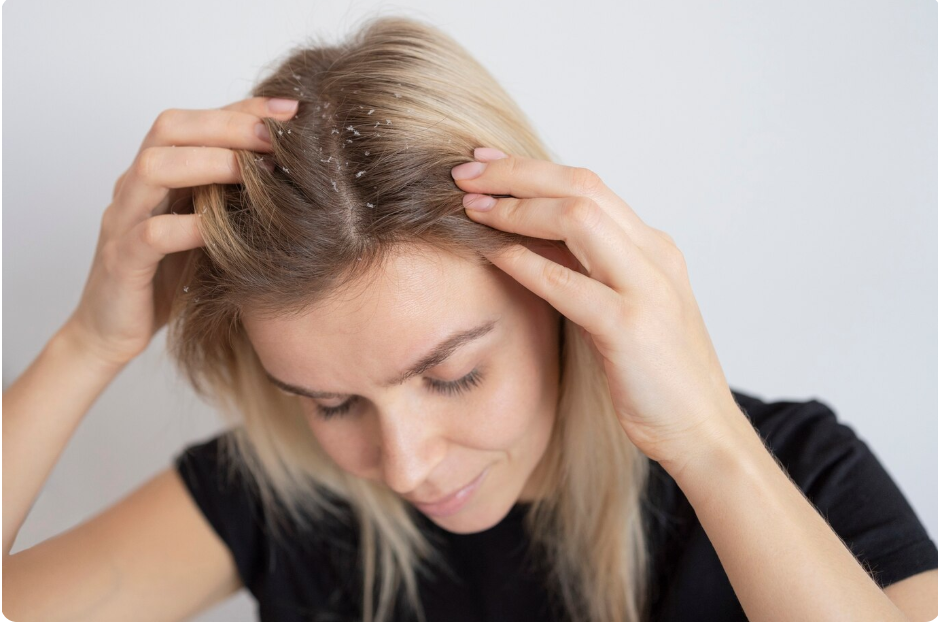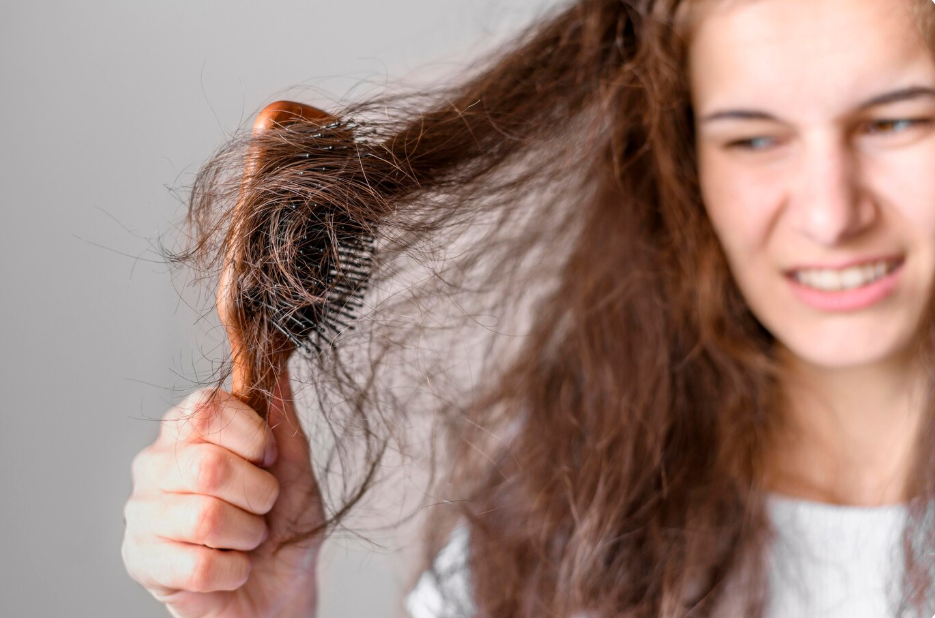Hair loss affects millions of people worldwide—men, women, young adults, and especially postpartum mothers. Whether you’re dealing with thinning hair, postpartum hair fall, or just want to regrow your locks naturally, this guide will cover what causes hair loss, natural remedies, what to drink to support regrowth, and even explain the “Big 3” of hair loss treatment.
What Is the Main Reason for Hair Loss?
Hair loss doesn’t have a one-size-fits-all cause. The reason for your hair shedding could vary based on gender, age, hormones, nutrition, or genetics. However, the most common causes include:
1. Genetics (Androgenetic Alopecia)
This is the most common cause of hair loss in both men and women and is often hereditary.
2. Hormonal Changes
Hormonal fluctuations from pregnancy, childbirth, menopause, or thyroid problems can trigger sudden hair fall.
3. Nutrient Deficiency
Low levels of iron, protein, vitamin D, zinc, and biotin can lead to hair thinning.
4. Stress and Poor Lifestyle
High stress levels, lack of sleep, smoking, or crash dieting can disrupt your hair’s growth cycle.
5. Medical Conditions
- PCOS
- Thyroid disorders
- Autoimmune diseases (like alopecia areata)
- Scalp infections like ringworm
6. Hair Treatments and Products
Excessive heat styling, coloring, bleaching, and using harsh shampoos can weaken hair strands.

How Will I Stop My Hair Falling Naturally?
Before jumping to medications, try these natural remedies and lifestyle changes to stop hair fall:
1. Eat a Hair-Healthy Diet
A well-balanced diet is the foundation of healthy hair. Focus on foods rich in:
- Protein (eggs, fish, tofu, lentils)
- Iron (spinach, beans, red meat)
- Omega-3 fatty acids (salmon, walnuts)
- Vitamin C (citrus fruits)
- Biotin & Zinc (eggs, pumpkin seeds, almonds)
2. Massage Your Scalp
Massaging your scalp with natural oils improves blood flow and stimulates the hair follicles. Use:
- Coconut oil
- Castor oil
- Rosemary essential oil (diluted)
Do this 2–3 times per week for best results.
3. Aloe Vera
Aloe vera has enzymes that promote healthy hair growth and soothe an itchy scalp. Apply pure aloe gel directly and leave it on for 30 minutes before rinsing.
4. Use Mild, Sulfate-Free Shampoo
Switch to shampoos with natural ingredients like:
- Tea tree oil
- Onion extract
- Biotin
- Argan oil
Avoid shampoos with parabens, sulfates, and artificial fragrances.
5. Avoid Heat and Chemical Styling
Let your hair air dry. Minimize straightening, curling, or chemical treatments, which can damage hair and lead to breakage.

How to Stop Hair Loss After Pregnancy?
Postpartum hair loss is very common and usually temporary. It happens due to the sudden drop in estrogen after delivery. Here’s how to manage it:
✅ Be Gentle with Your Hair
- Use a wide-toothed comb
- Avoid tight ponytails or buns
- Pat your hair dry—don’t rub
✅ Maintain a Nutrient-Rich Diet
Focus on iron, folic acid, calcium, and vitamins. Continue taking prenatal vitamins if advised by your doctor.
✅ Try Natural Hair Oils
- Mix castor oil + coconut oil
- Add a few drops of lavender or rosemary essential oil
✅ Reduce Stress
Postpartum depression or fatigue can worsen hair fall. Practice:
- Meditation
- Breathing exercises
- Gentle postpartum yoga
Note: Most postpartum hair loss slows down after 6–12 months.

What Can I Drink to Regrow Hair?
Your diet plays a big role in hair growth—and what you drink can nourish your hair from the inside out.
🍵 Drinks That Support Hair Regrowth:
| Drink | Benefits |
|---|---|
| Green Tea | Rich in antioxidants, reduces DHT (a hormone that causes hair loss) |
| Amla Juice | High in vitamin C, strengthens hair roots |
| Spinach or Kale Smoothie | Packed with iron, folate, and vitamin A for hair growth |
| Carrot Juice | Beta-carotene boosts scalp health and sebum production |
| Coconut Water | Hydrates and contains essential minerals like potassium and magnesium |
| Protein Shakes | Ensure enough protein intake if your diet is lacking |
💧Bonus Tip: Stay hydrated! Drinking enough water daily supports cell function and circulation.
What Is the Big 3 of Hair Loss?
In the world of clinical hair loss treatment, the “Big 3” refers to three scientifically backed treatments used especially for male pattern baldness, but also applicable to women in certain cases.
1. Minoxidil (Topical)
- Over-the-counter solution (e.g., Rogaine)
- Promotes hair regrowth by improving blood flow to follicles
- Apply directly to the scalp twice a day
2. Finasteride (Oral)
- Prescription medication (e.g., Propecia)
- Blocks DHT, a hormone that shrinks hair follicles
- Only for men; not suitable for women of childbearing age
3. Ketoconazole (Shampoo)
- Antifungal shampoo (e.g., Nizoral)
- Reduces inflammation and possibly DHT levels on the scalp
- Use 2–3 times a week
⚠️ Important: Always consult a doctor or dermatologist before starting these treatments, especially if pregnant, breastfeeding, or have underlying health issues.
Final Thoughts: Create a Healthy Hair Routine
Hair loss is often a sign your body needs more care—whether nutritionally, hormonally, or emotionally. Here’s a simple checklist to manage hair fall naturally:
✔ Natural Hair Loss Prevention Checklist:
- Eat a nutrient-rich, high-protein diet
- Stay hydrated
- Use gentle, sulfate-free hair care products
- Massage scalp weekly with essential oils
- Avoid heat styling and harsh chemical treatments
- Reduce stress and get enough sleep
- Consult a professional if hair fall persists beyond 3–6 months
Remember, hair regrowth is a slow but steady process. Be patient, stay consistent, and your hair will thank you in time.
